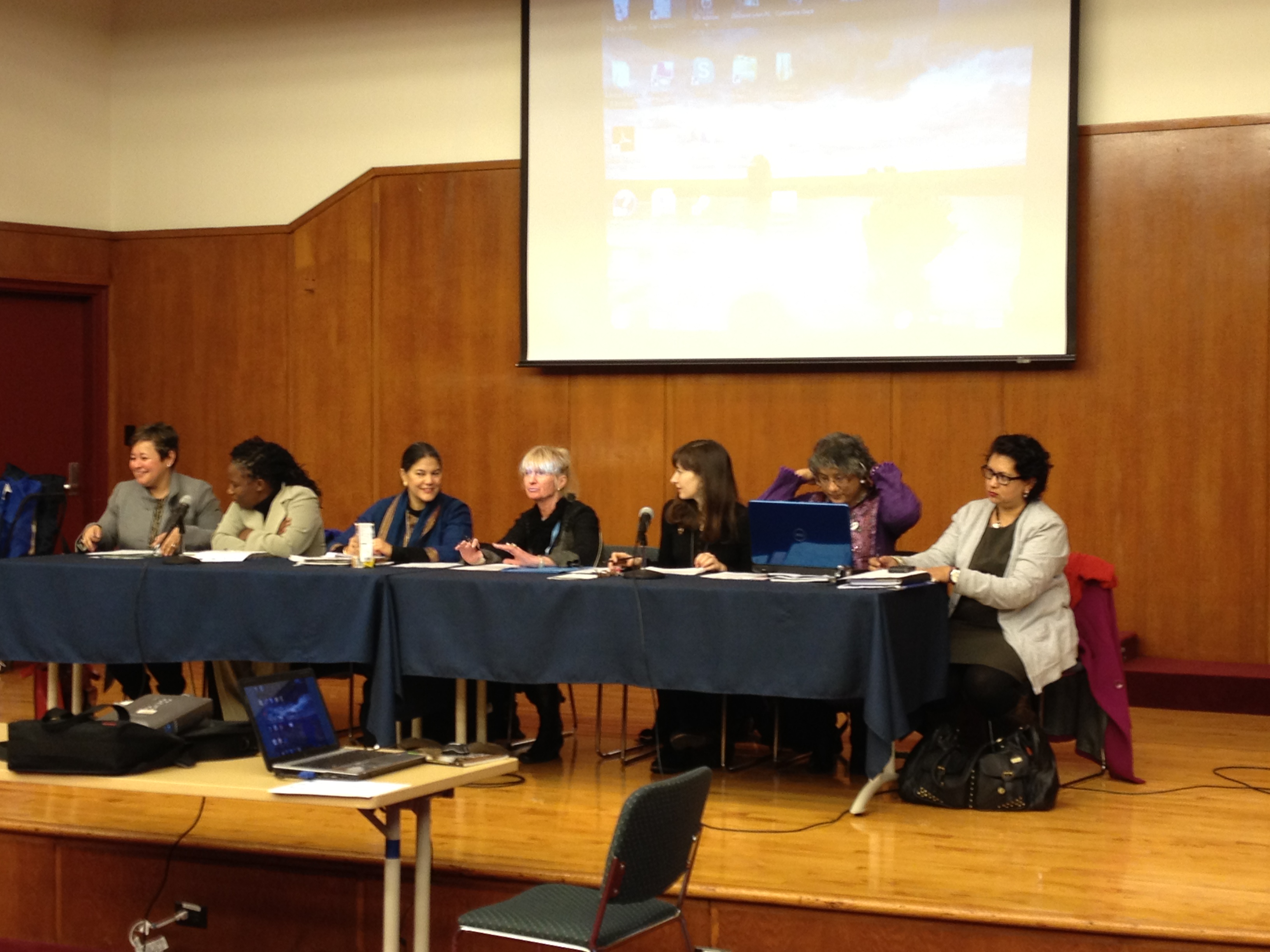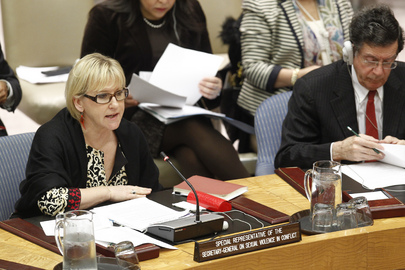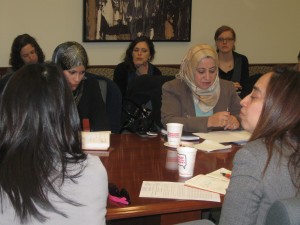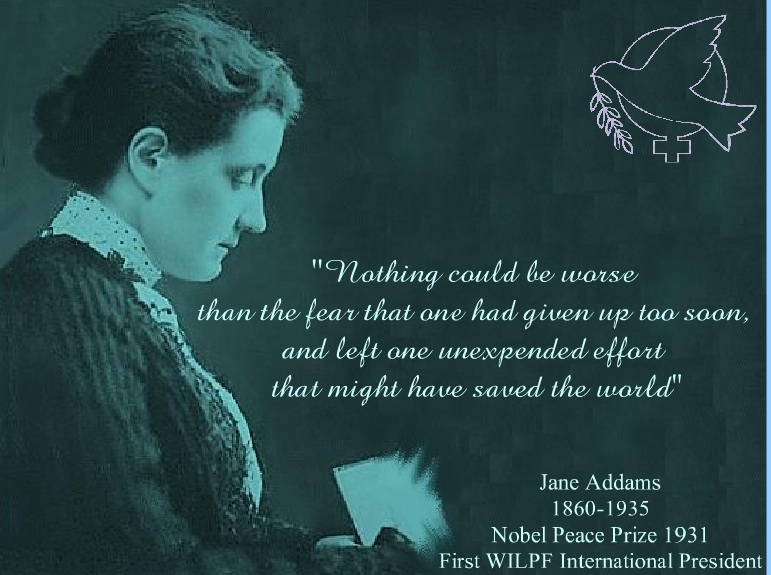WILPF voices at CSW 56
If you have any difficulty reading this newsletter in HTML, please view it online here >>
This week, violence has dominated the news with a horrific massacre in Kandahar, Afghanistan, the ongoing slaughter of civilians in Homs, Syria and disproportionate violence against communities in Gaza, Palestine. WILPF used the opportunity of our statement on international women's day last week to call for us to raise our voices, to protest and to keep working for peace.
Women, despite the barriers, violence and challenges, did gather, did organize and did call for action around the world on March 8. For example Palestinian women rallied in Gaza and Ramallah to mark International Women's Day and Afghan Women's Network (AWN) Theme for 2012 was “Let us End Violence against Women! Let us push for implementation of Violence against Women Law!”
Since the last PeaceWomen ENews, we have been very busy with International Women's Day, the Security Council civil society (Arria Formula) meeting on Mediation, the annual Commission on the Status of Women and the Security Council open debate on Sexual Violence.
In Geneva, WILPF held seminar on Disarmament through International Law and Human Rights. The seminar is based on the WILPF December law conference. Also in Geneva, Beatrice Fihn, project manager of Reaching Critical Will/WILPF, delivered WILPF statement to the Conference on Disarmament emphasizing that “the cost of the continued renewal, deployment, and maintenance of nuclear weapons should be put in relation to budgets available to fulfil human rights obligations.”
In New York on IWD 2012, we participated in a march for global women for equality, development and peace. In the afternoon, we attended and monitored the Security Council's closed meeting with civil society (called Arria Formula) on "Women's role in mediation and post-conflict resolution" co-chaired by UK and Portugal. Read more here about Arria meeting>>. Also on March 8, UN Secretary-General Ban Ki-moon and the president of the 66th session of the UN General Assembly Nassir Abdulaziz Al-Nasser proposed the idea of holding a global conference on women's issues in 2015, 20 years after the last women's summit held in Beijing. The proposed Fifth Global Conference on Women is current being discussed by WILPF executive committee.
 During this year's CSW, WILPF was active at numerous events and actively voiced its ongoing recommendations for a holistic approach to conflict prevention, by way of statements and though advocacy efforts. In addition WILPF held several side events, the first convened by our Nigerian Section on “Human Security for Rural Women in Nigeria - using SCR 1325”. Here, Joy Onyesoh the WILPF-Nigeria president highlighted the urgent need to advance the process of formulating and drafting a comprehensive Nigerian National Action Plan for implementation of SCR 1325. Sameena Nazir, WILPF Pakistan, spoke at our second panel, which was co-hosted by various CSO organisations and entitled “Food, Sovereignty, Conflict and Peace”.
During this year's CSW, WILPF was active at numerous events and actively voiced its ongoing recommendations for a holistic approach to conflict prevention, by way of statements and though advocacy efforts. In addition WILPF held several side events, the first convened by our Nigerian Section on “Human Security for Rural Women in Nigeria - using SCR 1325”. Here, Joy Onyesoh the WILPF-Nigeria president highlighted the urgent need to advance the process of formulating and drafting a comprehensive Nigerian National Action Plan for implementation of SCR 1325. Sameena Nazir, WILPF Pakistan, spoke at our second panel, which was co-hosted by various CSO organisations and entitled “Food, Sovereignty, Conflict and Peace”.
Balancing a busy schedule Sameena also spoke at several other events and panels where she advocated for comprehensive peace and inclusion of women in mediation and resolution efforts, as well as in formation of policy. On Friday March 2nd, US WILPF and PeaceWomen co-hosted an event recognizing the release of the U.S. National Action Plan on Women, Peace and Security (SCR 1325) and celebrating the publication of WILPF's report on the Civil Society Consultations held during the drafting period. I also spoke on a panel “Rural Women and 1325” hosted by YWCA, and WILPF spoke at 2 panels with friends “Women, War and Peace” series.
Read WILPF's official CSW 56 Statement>>
PeaceWomen monitored the February 23rd Women, Peace, and Security: Conflict- Related Sexual Violence. As a member of the NGO Working Group on Women, Peace and Security, we importantly were able to secure a civil society speaker seat at the meeting. The statement was delivered on behalf of civil society by Ms. Amina Megheirb, President of Attawasul Association, a Libyan NGO in Benghazi working on women's empowerment. This statement urged all actors to take the immediate and relevant action on conflict-related sexual violence and emphasized the need to prioritize prevention as a means of ensuring a survivor-centric approach; and to strengthen efforts to ensure justice and accountability. We also called on all actors to address the root causes of sexual violence. For full summary, documents and analysis, click here >>.
This ENews also includes updates and articles on: the inaugural meeting of the WILPF Africa Working Group; WILPF participation at the seminar on Gender and the Responsibility; overview of Gender & the International Judicial Systems; and links to work by WILPF's Reaching Critical project.
 |
 |
 |
 |
| WILPF Nigeria side event | Aniqa (WILPF Pakistan) and Maria | WILPF Pakistan fair | WILPF Panel, March 1 |
Sexual Violence in Conflict and Arria Formula on Mediation
Open Debate on Sexual Violence in Conflict
On February 23 2012, the Security Council held an open debate on Women, Peace, and Security: Conflict- Related Sexual Violence. 51 statements were made during the open debate, including statements by the Special Representative of the Secretary-General on Sexual Violence Margot Wallström (SRSG); Under-Secretary-General for Peacekeeping Operations Hervé Ladsous; Amina Megh
eirb on behalf of the NGO Working Group on Women, Peace and Security (NGOWG); and member state representatives. The closed negotiation of the Security Council resulted in the adoption of the Presidential Statement S/PRST/2012/3. The main focus of the debate was the Secretary-General's Report on Conflict-related Sexual Violence (S/2012/33), which highlights the ongoing incidence of sexual violence in conflict and post-conflict situations relevant to the reporting period (December 2010 to Novem
ber 2011) and also includes for the first time an annexed list of parties responsible for patterns of rape in conflict (as requested by the Security Council in SCR 1960), referred to often as the “naming and shaming mechanism”. Present in the negotiation of the Presidential Statement (PRST) and in the debate itself was the disagreement among States related to the scope and definition of the SRSG's mandate.
 Security Council Arria Formula on "Women's role in mediation and post-conflict resolution" on International Women's Day 2012, 8 March 2012
Security Council Arria Formula on "Women's role in mediation and post-conflict resolution" on International Women's Day 2012, 8 March 2012
The Permanent Missions of the United Kingdom and Portugal held an Arria formula meeting on International Women's Day to highlight the need for the greater participation of women in mediation and conflict resolution. This Arria meeting was held as an opportunity for dialogue between civil society and the Security Council, marking International Women's Day with an interactive discussion on the challenges, and the progress already made, in this important area. Speakers include Betty Atuku Bigombe, Ugandan State Minister for Water Resources, and Jamal Benomar, the Secretary-General's Special Adviser on Yemen and Shadia Marhaban, President of the Aceh Women's League (LINA). Minister Bigombe participated in mediation with the Lord's Resistance Army. Jamal Benomar has worked with women mediators in Yemen. Shadia Marhaban participated in mediation of the Aceh peace talks.
WILPF at the CSW
March got off to an energetic start at the Peacewomen Project with the annual Commission on the Status of Women (CSW) taking place from Feb 27th - March 9th. The CSW saw strong participation from WILPF, with representatives from Sweden, Lebanon, Pakistan, Nigeria, Japan and the US making the trip to New York to take part in the general debate and hundreds of side events.
This year WILPF held several side events, the first convened by our Nigerian Section on “Human Security for Rural Women in Nigeria - using SCR 1325” and with representation by WILPF Pakistan entitled “Food, Sovereignty, Conflict and Peace”.
On Friday, March 2, Charlotte Bunch and Ambassador Anwaral Chowdhury joined Peacewomen and WILPF U.S. in celebrating the launch of WILPF's Report of the Civil Society Consultations on the Development of the U.S. National Action Plan on Women, Peace and Security (UNSCR1325) at a cocktail reception held at the Vermilion restaurant in New York City.
 WILPF's US section was able to bring two special delegations to the CSW this year: Practicum in Advocacy and Local2Global program. The delegation enrolled through the Practicum in Advocacy at the United Nations, co-sponsored by the Center for Women's Health and Human Rights at Suffolk University and the National Women's Studies Association, included 20 women from 18 colleges and universities located in 13 states with 8 different countries of birth. This highly competitive educational program is building the next generation of WILPF activists, and all participants receive coaching in lobbying, networking and campaign strategy. Further, WILPF U.S. brought a delegation of 8 experienced WILPF activists to the CSW for a week-long immersion in the structures and "language" of the United Nations as part of the Local2Global program, underwritten by a very special WILPF donor.
WILPF's US section was able to bring two special delegations to the CSW this year: Practicum in Advocacy and Local2Global program. The delegation enrolled through the Practicum in Advocacy at the United Nations, co-sponsored by the Center for Women's Health and Human Rights at Suffolk University and the National Women's Studies Association, included 20 women from 18 colleges and universities located in 13 states with 8 different countries of birth. This highly competitive educational program is building the next generation of WILPF activists, and all participants receive coaching in lobbying, networking and campaign strategy. Further, WILPF U.S. brought a delegation of 8 experienced WILPF activists to the CSW for a week-long immersion in the structures and "language" of the United Nations as part of the Local2Global program, underwritten by a very special WILPF donor.
In addition to supporting international networking, delegates in the Local2Global program make a commitment to sharing information gained at the CSW and its parallel events with WILPF members in their hometowns and throughout the section. The Local2Global program is in its second year; the Practicum in its fifth. Outreach for both programs begins in September.
Photo: WILPF U.S. delegates visit the Museum of Modern Art to view a retrospective of video, photography and collage by Yugoslavian feminist Sanja Iveković.
Background Summary: Gender in International Judicial Systems
Background Summary: Gender in International Judicial Systems
This article is not written as a comprehensive summary of gender and international law but a short overview of recent developments linked to the international law, the International Criminal Court (ICC) and the Extraordinary Chambers in the Courts of Cambodia (ECCC). The article discusses cases related to Côte d'Ivoire, Kenya, Democratic Republic of Congo (DRC), among others.
Today, ten years after the creation of the Rome Treaty-governed International Criminal Court (ICC), we continue to witness significant developments in the international prosecution of gender-based crimes, in domestic courts as well as in ad hoc and hybrid tribunals. However, access to justice remains elusive for women in many conflict situations, with gender crimes remaining particularly vulnerable to both omission from filings and ultimate failure to reach trial phase - a finding that was articulated in December, with the release of the ICC's 2011 Gender Report Card.
The PeaceWomen Project looks to the appointment of Ms. Fatou Bensouda, the first female chief prosecutor of the International Criminal Court, as an opportunity for the ICC to further the women, peace and security agenda through better practices for including survivors of gender crimes and preserving their testimonies and related evidence.
Please see here for an expanded explanation of the developments and gaps in international justice for crimes commited against humaninty, incluidng rape.
Suggested Resources:
-
Rape and sexual violence - Human Rights Law and standards in the International Criminal Court, Amnesty International
Grace Jennings-Edquist (PeaceWomen intern)
Inaugural Meeting of the WILPF African Working Group
The inaugural meeting of the WILPF Africa Working Group was held in Enugu, Nigeria on the 16th February and was attended by members of WILPF- DRC and Nigeria.
The African working group was initiated during the WILPF congress in Costa Rica (August 2011) with Joy Onyesoh of Nigeria as the convener. The working group would have as part of its mandate the building of solidarity and WILPF membership within the African Region, taking into cognisance our peculiar challenges, cultural, social, economic and political similarities within the region.
 Expected Results from AWG 2012-2015
Expected Results from AWG 2012-2015
Emergence of more African sections and growth in WILPF membership.
A clearer understanding/practice of UNSCR 1325 among the African regional member sections/groups.
Greater solidarity and cooperation within the region
A co-ordinated advocacy on specific women issues within the region.
Greater visibility of the grass root women within the existing Africa sections
Emergence and sustenance of a very visible YWILPF in the region.
Email: Wilpf Nigeria wilpfnigeria@ymail.com
Seminar on Integrating Gender Perspectives into the Third Pillar of the Responsibility to Protect
On February 21, a group of 35 scholars and activists gathered at the UN for a GAPW-sponsored event on Integrating Gender Perspectives into the Third Pillar of the Responsibility to Protect (RtoP).
The event featured Naomi Kikoler, Director of Policy and Advocacy for the Global Center on the Responsibility to Protect and Maria Butler, Director of the PeaceWomen Project of the Women's International League for Peace and Freedom.
We were also joined by two extraordinary Libyan women who spoke eloquently about the time of suffering in their country and offered insights into evolving roles of women in Libya and why the UN authorized response in their country was needed. 
From WILPF perspective, Maria shared WILPF's recent comments on R2P: “Protection, real protection, can only be realized through prevention. This is the essence of responsibility to protect and the essence of all the Security Council Resolutions on women, peace, and security.
The doctrine is there to prevent: it has failed and will continue to be demeaned, if it is used as a means to legitimize armed intervention.”
As the WILPF statement underlines the multilateral systems that are supposed to ensure that international law is upheld, that human rights are protected and that there is accountability for violations, failed the people of Libya and failed well before the SCR 1973. WILPF's comments at this meeting focused on the need to make sure that we are looking at prevention in a holistic and integrated manner.
Effective prevention of mass atrocities will need to take on this integrated and early approach, which must include a gender perspective.
For access to the draft Concept Note on gender and R2P, click here.
Reaching Critical Will Update
On 8 March, the Women's International League for Peace and Freedom delivered its annual International Women's Day statement in the Conference on Disarmament.
UN Programme of Action Preparatory Committee
A PrepCom for the upcoming Second Review Conference of the UN Programme of Action on small arms and light weapons will meet in New York from 19-23 March 2012. Check out our website for details and follow the action with the Small Arms Monitor when the meeting begins.
Nuclear Non-Proliferation Treaty Preparatory Committee
The first PrepCom for the 2015 Review Conference will meet in Vienna from 30 April-11 May 2012. A calendar of events is now available. Some information for NGO participation is also available. Stay tuned with RCW for more details in the coming months.
The fourth ATT PrepCom ended Friday in New York. Check out the ATT Monitor to find out what happened. Also find documents and statements on our website.
The third report on the implementation of the 2010 NPT action plan is now available! Please find all three reports available here.
Join RCW email listserves or subscribe to information services


